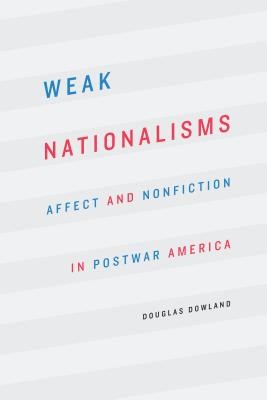
- We will send in 10–14 business days.
- Author: Douglas Dowland
- Publisher: University of Nebraska Press
- Year: 2019
- Pages: 288
- ISBN-10: 1496200500
- ISBN-13: 9781496200501
- Format: 15.2 x 22.9 x 2.1 cm, hardcover
- Language: English
- SAVE -10% with code: EXTRA
Reviews
Description
The question "What is America?" has taken on new urgency. Weak Nationalisms explores the emotional dynamics behind that question by examining how a range of authors have attempted to answer it through nonfiction since the Second World War, revealing the complex and dynamic ways in which affects shape the literary construction of everyday experience in the United States.
Douglas Dowland studies these attempts to define the nation in an eclectic selection of texts from writers such as Simone de Beauvoir, John Steinbeck, Charles Kuralt, Jane Smiley, and Sarah Vowell. Each of these texts makes use of synecdoche, and Weak Nationalisms shows how this rhetorical technique is variously driven by affects including curiosity, discontent, hopefulness, and incredulity. In exploring the function of synecdoche in the creative construction of the United States, Dowland draws attention to the evocative politics and literary richness of nationalism and connects critical literary practices to broader discussions involving affect theory and cultural representation.
EXTRA 10 % discount with code: EXTRA
The promotion ends in 17d.22:38:41
The discount code is valid when purchasing from 10 €. Discounts do not stack.
- Author: Douglas Dowland
- Publisher: University of Nebraska Press
- Year: 2019
- Pages: 288
- ISBN-10: 1496200500
- ISBN-13: 9781496200501
- Format: 15.2 x 22.9 x 2.1 cm, hardcover
- Language: English English
The question "What is America?" has taken on new urgency. Weak Nationalisms explores the emotional dynamics behind that question by examining how a range of authors have attempted to answer it through nonfiction since the Second World War, revealing the complex and dynamic ways in which affects shape the literary construction of everyday experience in the United States.
Douglas Dowland studies these attempts to define the nation in an eclectic selection of texts from writers such as Simone de Beauvoir, John Steinbeck, Charles Kuralt, Jane Smiley, and Sarah Vowell. Each of these texts makes use of synecdoche, and Weak Nationalisms shows how this rhetorical technique is variously driven by affects including curiosity, discontent, hopefulness, and incredulity. In exploring the function of synecdoche in the creative construction of the United States, Dowland draws attention to the evocative politics and literary richness of nationalism and connects critical literary practices to broader discussions involving affect theory and cultural representation.


Reviews